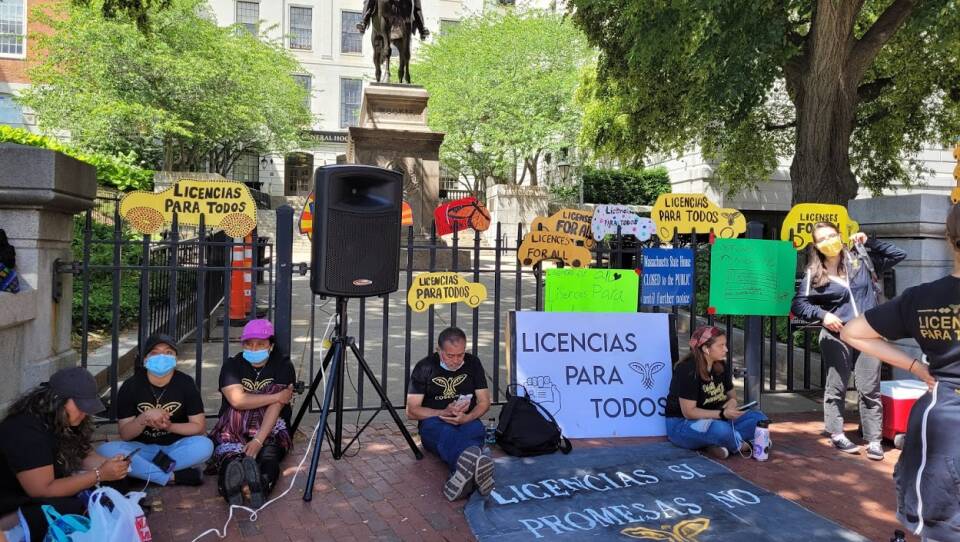Late last week, the Massachusetts Legislature passed a bill that would allow unauthorized immigrants to secure driver's licenses, the culmination of decades of advocacy by those who believe this enhances public safety. But the measure is not without opposition. Governor Baker formally opposes it and he vetoed the bill on Friday. Daniel Medwed, GBH News legal analyst and Northeastern University law professor, joined GBH Morning Edition hosts Paris Alston and Jeremy Siegel to discuss the measure and the controversy surrounding it. This transcipt has been edited for clarity and length.
Paris Alston: All right, Daniel. So you know how we do it here. Let's set the stage. What exactly would this bill do?
Daniel Medwed: So at present, non-citizens in Massachusetts who have permanent resident status or a green card are eligible for a driver's license, but not people who are here illegally. This bill would change that on July 1st, 2023, if enacted. It would allow people without legal immigration status, an estimated quarter of a million people here in the commonwealth, to apply for driver's licenses, showing two documents that verify their identity. It could be a consular ID card, a foreign birth certificate, a divorce decree, a marriage decree, things like that.
Now, proponents of this bill basically cite two major benefits, and you mentioned one of them at the top. First, public safety. It would ensure that unauthorized immigrants have licensure, that they go through driving tests, that they're licensed by the state. It would also ensure that they're eligible potentially to get insurance. For those reasons, a majority of state sheriffs, district attorneys and chiefs of major cities in Massachusetts support this bill. The second chief benefit is largely humanitarian. If someone who is undocumented gets pulled over on the side of the road for a driving infraction, it could ensnare them in the federal immigration process, lead to detention or maybe deportation. And that, of course, could lead to family separation, which is really problematic. So that's sort of an overview of this measure.
Jeremy Siegel: You mentioned some of the reasons that groups want this to become law here in Massachusetts. Do other states have any laws like this in place?
Medwed: Apparently, 16 states and the District of Columbia have similar laws. Now, the details vary considerably, I should note, but the gist is the same, that it's giving people who are not documented a chance to drive legally. So, for instance, in Utah, it's not a driver's license. You can apply for a one-year privilege [for] a driving authorization card. And the law in Utah basically specifies that that ID may not be used with government entities. In contrast, other states like New York basically treat this as the equivalent of a valid driver's license, similar to those that are available to citizens. And in New York, there's even a provision that says that the state may not share data about unauthorized immigrants with federal immigration authorities. So they run the gamut. But in 16 states and the District of Columbia, there are similar measures.
Alston: So why are folks opposed to this?
Medwed: Generally speaking, within the Republican Party, both nationally and locally, the major concern boils down to the fear of illegal voting. So, for instance, in Massachusetts, our law mandates that the Registry of Motor Vehicles automatically registers voting eligible drivers to vote. And some Republicans have expressed concern here that the RMV might inadvertently register undocumented immigrants or that undocumented immigrants might use these driver's licenses to apply to vote at the polls. For those reasons, some Republicans in our state legislature tried to include language in this bill that would require bold text on each of these driver's licenses that would say something like “not eligible to vote.” But those amendments, those proposals didn't pass.
Siegel: You were mentioning concerns about illegal voting here. Immediately [that] brings my mind to the unfounded claims of voter fraud that we all heard from Donald Trump and his supporters after the 2020 election. Do these concerns about voting that Republicans have raised here strike you as legitimate?
Medwed: They don't strike me as legitimate. I think they do resemble some of those claims we heard all too recently from Donald Trump and his allies. Here's why I don't think they're very legitimate. First and foremost, lawmakers in Massachusetts anticipated this concern, however remote. And there is language in this law that requires the registry of motor vehicles to, quote, “ensure” that unauthorized immigrants are not automatically registered to vote. What's more, our Secretary of State, William Galvin, who is basically the person who oversees election integrity in the Commonwealth, has called these claims a, quote, “red herring” and expressed confidence that his office is well positioned to make sure that people don't illegally register. So it seems like these are, to put it mildly, overblown concerns.
"So it seems like it's pretty much a fait accompli, this will become the law in Massachusetts."-Daniel Medwed, GBH News legal analyst
Alston: We've mentioned that the bill passed by an overwhelming margin in both the House and the Senate. But Governor Baker nevertheless vetoed it on Friday. So what does that mean for the future of the bill, Daniel?
Medwed: Well, because of that overwhelming margin, Paris, that basically means that the law is veto-proof. In Massachusetts, if a bill passes by two-thirds in both branches of the Legislature, then the legislature may override a gubernatorial veto. The numbers here were significant. They were above the two-thirds margin. And spokespeople for the leadership in both the House and the Senate have already indicated that they intend to override Governor Baker's veto. So it seems like it's pretty much a fait accompli, this will become the law in Massachusetts.
Siegel: So why did Baker veto this, given the fact that it passed with a veto-proof majority?
Medwed: That's such a good question. And I'm not a political scientist, so I'm really not sure. But on the one hand, it could just be that he has consistently opposed this bill. It may be a matter of principle. He genuinely believes that it could lead to illegal voting. On the other hand, maybe there's a longer-term political calculation. I'm not exactly sure. It's a way to keep him, to some extent, aligned with Republican messaging on this and concerns about immigration and voter voting integrity. It was puzzling to me, too.









